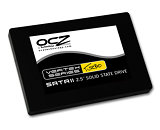Wednesday, July 8th 2009

OCZ Unveils the Vertex Turbo SSDs With a Few Updates
OCZ Technology Group, a worldwide leader in innovative, ultra-high performance and high reliability memory and computer components, today released the latest addition to their premium Vertex solid state drive series, the Vertex Turbo Edition. The tried-and-true architecture and performance of the original Vertex has been upgraded to meet the demands of enthusiasts and other performance-seeking users who benefit from SSD technology. The Vertex Turbo Series maximizes the potential for ultimate productivity and state-of-the-art computing experience, by increasing both the host clock-speed and the SDR DRAM Cache to 180 MHz versus 166 MHz on the original series."OCZ is constantly looking for ways to advance our solutions, and based on feedback from our enthusiast consumers and top system integrators we looked for ways to further push the performance envelope in our popular Vertex Series of SSD's," commented Ryan Edwards, Director of Product Management for the OCZ Technology Group. "The new Vertex Turbo makes use of the fastest SDR DRAM cache available and a proprietary FTL level firmware that provides an even faster solid state drive for enthusiasts looking for the ultimate desktop or laptop storage upgrade."
OCZ Vertex Turbo Series provides a cutting-edge design for enthusiasts looking to transform their desktops or laptops. Enabled by a proprietary firmware and 64 MB of 180 MHz DRAM cache, the Vertex Turbo Edition ramps up performance levels to new heights, while providing the snappy computing, longer battery life, and shorter boot-ups users have enjoyed from the original. The Vertex Turbo delivers best-in-class read and write speeds clocking in at up to 270 MB/s read and 210 MB/s write along with the lower power consumption and superior durability compared to conventional hard drives.
OCZ continues to pioneer the flash-based storage initiative, by offering a variety of performance options and expanding its reach to all areas of computing interests and system preferences. OCZ Vertex Turbo is the result of the latest breakthroughs in SSD technology that translates to enthusiast-class data storage enthusiasts have come to expect from OCZ. Available in capacities of 30 GB (32), 60 GB (64), 120 GB (128), and 250 GB (256), Vertex Turbo SSDs offers ample room for all your data and comes backed with an industry leading 3 Year Warranty and OCZ's exemplary service and support.
For more information about the OCZ Vertex Turbo Edition SSD, please click here.
Source:
OCZ Technology
OCZ Vertex Turbo Series provides a cutting-edge design for enthusiasts looking to transform their desktops or laptops. Enabled by a proprietary firmware and 64 MB of 180 MHz DRAM cache, the Vertex Turbo Edition ramps up performance levels to new heights, while providing the snappy computing, longer battery life, and shorter boot-ups users have enjoyed from the original. The Vertex Turbo delivers best-in-class read and write speeds clocking in at up to 270 MB/s read and 210 MB/s write along with the lower power consumption and superior durability compared to conventional hard drives.
OCZ continues to pioneer the flash-based storage initiative, by offering a variety of performance options and expanding its reach to all areas of computing interests and system preferences. OCZ Vertex Turbo is the result of the latest breakthroughs in SSD technology that translates to enthusiast-class data storage enthusiasts have come to expect from OCZ. Available in capacities of 30 GB (32), 60 GB (64), 120 GB (128), and 250 GB (256), Vertex Turbo SSDs offers ample room for all your data and comes backed with an industry leading 3 Year Warranty and OCZ's exemplary service and support.
For more information about the OCZ Vertex Turbo Edition SSD, please click here.

21 Comments on OCZ Unveils the Vertex Turbo SSDs With a Few Updates
Unlike Ye Olde HDDs, where if the controller is dead, you can simply swap the control PCB from an identical drive to recover data, you can't do it with SSDs. Everything including the NAND flash chips are soldered onto one PCB.
I think a $300 with 128GB - 256GB SSD with these performance is all what a customer like me need for his OS :D
sadly these performance and this size is still in $600+ price range !!
Gain? 64MB of cached data can be accessed 8% faster. The theoretic maximum gain in ideal conditions is therefore 64MB/270MB per sec = 0.237 seconds worth of data being pulled in 8% faster = 0.219 secs which is a GRAND TOTAL SAVING of 0.018 seconds. I dont think I would even notice that.
Any other data read/write, e.g. loading programs, games, virtual memory, etc. is bottlenecked by the read/write speed of the flash memory.
MUCH BETTER PERFORMANCE IMPROVEMENT IS GAINED BY:
1./ Faster flash memory. Oh yes, that's obvious, but "spun out" of the marketing
2./ Increasing the cache from 64MB to 128MB or 256MB
3./ Internal RAIDing of the flash memory